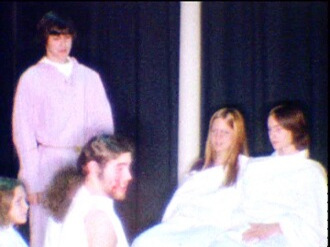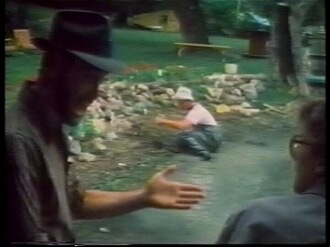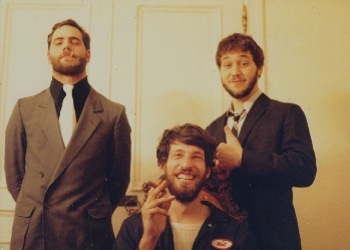|
|
This is an email interview conducted with Josh Becker on November 20, 2009. It concentrates on the early Super-8 days, rather than his later involvement with the Evil Dead trilogy, which has already been quite extensively covered in the various books available.
Josh directed, and assisted with numerous Super-8 productions, along with writing & directing a list of feature films including Thou Shalt Not Kill... Except & Running Time. He was also a crew member on The Evil Dead managing a large portion of the lighting and sound, along with cameo roles in Evil Dead II & Army Of Darkness. Josh's new book Going Hollywood is now available in paperback Here from Amazon.com, and I would also highly recommend his previous book Rushes, which covers the Super-8 shorts period, and has an extended version of his Evil Dead journal which covers events before and after shooting in Tennessee.
Josh also sells excellent quality professional DVD transfers of a number of the Super-8 shorts. Currently there are five shorts discs available; disc one has Stryker's War, disc two has The Blind Waiter & Oedipus Rex, disc three has Holding It, disc four has Acting & Reacting & The Final Round, and disc five has Cleveland Smith Bounty Hunter, The Case of the Topanga Pearl, Super Student, and Public Enemy Revisited. Here is a direct link to the DVD purchase page on Josh's website, or you can keep up with all of Josh's latest projects on the main site; Beckerfilms.com

Hi Josh, thanks for talking to us. To start, At what point and why did the the various members officially decide to form the Metropolitan Film Group, and did that change the way you worked together, or did it just give the existing group an official title?
The Metropolitan Film Group formed about a year before I was involved, in 1975 if I'm not mistaken. I ridiculed the whole thing because it seemed more like a social club than a group of filmmakers. This is when Sam, Scott and Bruce made James Bombed, The Jimmy Hoffa Story and Six Months to Live, as well as an incomplete film called Mystery No Mystery that was the basis for It's Murder! In reality, the Metropolitan Film Group was producing a lot of films - more than me - but I was just a snotty kid. When I first came into the picture in 1976 to make The Case of the Topanga Pearl, I don't think I was even aware that the Metropolitan Film Group existed.

Josh, Sheldon Lettich & Bruce while shooting Acting & Reacting (1978)
|
|
My next film, The Final Round, had the entire group involved, but it wasn't a Metropolitan Film Group production, it was my company at the time, which was Midwest Moving Pictures. I think the first time I used the Metropolitan Film Group was on The Blind Waiter in 1980, although I could be wrong. The formation of the Metropolitan Film Group just consisted of getting business cards.
Do you still keep in contact with the other various members the group?
I'm still very good friends with Bruce Campbell, I actually spoke with him just yesterday. Since I'm friends with Sam's brother Ivan, as well as Mr. and Mrs. Raimi, I still see Sam on rare occasions at Bar and Bat Mitzvahs. I was very good friends with Rob Tapert, but after Hercules and Xena got cancelled our relationship faded away, which is a shame. I no longer have any contact with Scott Spiegel or John Cameron. I've seen Mike Ditz once in the past decade, and Bill Kirk died.
|
How was the film making process tackled within the group, and how much planning went into each short? Was the plot planned well in advance with scripts, storyboards & shot lists, made up to an extent as shooting the shooting day progressed, or a combination of the two?
There were no collective decisions. it was groups within the group, with everything was done in factions. Sam and Scott; Sam, Scott and Bruce; Bruce and I; Scott, Bruce and I. Basically, you had three different approaches: Sam's, Scott's and mine. Scott started making movies the earliest doing Three Stooges remakes, which used the actual soundtracks from the Stooges' shorts to which Scott and his fellow Stooge impersonators lip-synced. Therefore Scott always knew exactly what scenes he was shooting, and what he was looking for even without a script or storyboards. Scott's early short, The Singing Nuts, with a very early appearance by Bruce, is hysterical. Sam and Scott became a team for a while making original short films that were all slapstick comedies, like: James Bombed, The Jimmy Hoffa Story and Six Months to Live, all of which were pretty darn funny. This is when Bruce stepped up and became the leading man. I'm pretty sure there were no scripts, shot lists or storyboards for any of these films, although Sam and Scott clearly knew what they were going to shoot ahead of time and were prepared with lines and props and costumes when the time came. There was certainly some improvisation, but it was within the scenes that had already been planned. My films, on the other hand, all co-produced with Bruce, had scripts, storyboards, prop lists, etc. This didn't make my films better by any means, it just made them quicker and easier to shoot, and they probably had the least improvisation. These films were of a more eclectic nature, ranging from comedy to drama to suspense to action. By the end of the super-8 era, and including a few 16mm shorts, Scott and I had teamed up to make slapstick comedies, with Bruce and Sam's help, and Sam had switched to horror, with Bruce, Scott and Rob Tapert's assistance.

Bruce (left), & Josh with a ponytail, age 14 in Oedipus Rex (1972)
|
|

Josh, Rob Tapert and Kurt Rauf in Torro, Torro, Torro! (1982)
|
What was the average length of a shoot, and was a specific amount of time allocated for in which to film a short, or did shooting just continue on and off where permitted until each one was completed?
Mine and Bruce's shorts had specific shooting schedules. We'd shoot over the course of three or four weekends, whereas the other films had a tendency to just keep going weekend after weekend until they were done. By the end, however, some of the films were being shot in as little as 2 days - Holding It, The Blind Waiter and Clockwork. Whereas others, like The Happy Valley Kid and It's Murder!, took months and months.
Was there a concious decision as to who was & wasn't involved in each short, or did it just come down to who had the spare time and was willing to contribute?
It depended on availability and interest. I offered Sam the lead in The Final Round, but he turned it down and took a smaller role because he was going to college and making his own film at the time. Bruce, Scott and I drove up to MSU to work on The Happy Valley Kid many times, but Sam, his brother Ivan, and Rob Tapert shot a lot of it when we weren't there. Scott and John Cameron refused to work on Holding It, then later also refused to work on The Evil Dead. I was never asked to work on John's film Shemp Eats the Moon. Bill Kirk came and went, playing small roles in many of the films, then the lead in Holding It. I came and went as camerman on It's Murder! Mike Ditz shot stills and helped with the lighting on many of the films. It all depended on the circumstances.
Were you happy to be involved in any of the shorts regardless of genre & content where your time permitted, or did you pick and choose what you did?
I worked on any film where they asked me. Probably the most consistent aspects of the shorts were Bruce, Sam and Scott appearing in almost all of them. Sam and Scott are in my film The Case of the Topanga Pearl, but not any of the other guys including Bruce (I didn't think of asking him). I was in California when they made Clockwork and Within the Woods.
Did the theatrical success of The Happy Valley Kid shape your perspective on the shorts you were directing yourself, such as directing more to a view of making a profit?
|
Yes. From there on out there was a more conscious effort to make commercial films, as though we had any clue what that meant. Sam and Scott followed up The Happy Valley Kid with the one and only feature-length super-8, It's Murder! made with the specific intention of showing it at MSU (Michigan State University), where it subsequently bombed horribly. I followed up with Holding It, which was probably the most straight-forward narrative of all the films, and an obvious homage to Hitchcock, as well as an obvious attempt at making a normal movie, as opposed to a comedy. Then Sam, Bruce, Rob and Scott made Within the Woods, which was intended from the outset to be a pilot for The Evil Dead. Bruce and I, with Sam and Scott, made Stryker's War with the specific intention of using it as a pilot for Thou Shalt Not Kill...Except. Scott, with John, Sam and I, made Night Crew which ultimately became Intruder. The love of film never waned, but commercialism certainly entered the picture.
|
|

Josh, Steve 'The Dart' Frankel and Sam (1980)
|
What is your view on why The Happy Valley Kid played so well to audiences, but It's Murder, faired so badly? Having seen it, it always seemed odd to me that it went down quite as badly as it did.
The Happy Valley Kid was aimed directly at MSU students. It was the story of an MSU student (Rob Tapert) who goes mad and kills his teachers and everyone who bugs him at the school. The film fulfilled a common fantasy among the students. It's Murder! was just a huge, ungainly slapstick comedy, albeit with some very funny scenes, that was not aimed at MSU students, so they didn't embrace it. That experience is what caused Sam to switch to horror. What's funny in a film that will get a laugh is far more up to conjecture than showing gore or having someone pop up into frame for a scare.
How did you view the change in tone from mostly comedies, into horrors such as Clockwork and Within The Woods.
As I mentioned, I wasn't there for that. I returned from L.A. right after Within the Woods was completed, but had no involvement with it. I thought it was the best super-8 film any of us had made. I saw it at quite a few screenings at parties and it worked like gangbusters.
How did the partners in Renaissance Pictures just come down to Rob, Sam & Bruce as opposed to anyone else in the group such as Scott Spiegel or yourself, and how did its formation affect the Metropolitan Film Group?
That was the end of the Metropolitan Film Group (although I'd already been kicked out so I didn't care). The formation of Renaissance Pictures occurred while I was away in L.A. Scott, John and Mike had their own issues, although I don't think that Sam, Bruce and Rob wanted them as part of the company. I don't think they wanted me, either, but I wasn't there.

Josh & Sam at the premiere of Book of the Dead (1981)
|
|

Josh's cameo role in Army of Darkness (1993)
|
Did you find the Super-8 group dynamic changed once Sam, Bruce & Rob began to concentrate full time on The Evil Dead?
Of course. From there on out we all concentrated on making features. Although we didn't shoot Thou Shalt Not Kill... Except until 1984 (it was completed it in 1985), I was trying to get it made as early as 1980, before The Evil Dead was finished.
The Happy Valley Kid and It's Murder were both shown theatrically in various local venues, were any of the Super-8 shorts made after this shown to paying audiences, and if so how were they received?
Yes. Scott and I had several paid screenings at our former high school, Wylie E. Groves, of Stryker's War, Night Crew, and The Blind Waiter. I guess they were received all right - people generally laughed or screamed when they were supposed to, and in any case, we kept showing them.

Josh & Cheryl in The Sappy Sap (1985)
|
|
The Sappy Sap was the last short, made in 1985. Why were there no more made after this?
We'd actually stopped making short films 3 or 4 years earlier. By 1985 Sam, Bruce and Rob had made two features, The Evil Dead and Crimewave, and Scott and I had made Thou Shalt Not Kill... Except. Nobody was interested in shorts anymore. However, since there was a rather long lag between Crimewave and Evil Dead II, like several years, Sam went nuts and had to shoot another movie, so he made The Sappy Sap. I'm the guy who looks like he's squeezing a woman's breasts, but is really screwing around with a parking meter. Like every movie Sam's ever made, it's got some really cool shots in it.
|
The Super-8 version of Stryker's War is due to be included as an extra on the upcoming Synapse DVD release of Thou Shalt Not Kill... Except. Did you manage to clear all the music rights for the cues you used, or did you have to make any substitutions?
That still remains to be seen, but there won't be any substitutions. Either the soundtrack is there or it's not. The music is the reason why Sam would never include Within the Woods with The Evil Dead, and Sam was absolutely right. The music that's on the films is inextricably part of them. I think the music rights issue is ridiculous. These are 30-year-old super-8 movies, for goodness sake, who cares?

L/R: David Goodman, Scott Spiegel, Tim Quill, Bruce & Don Campbell, unknown, Ted Raimi, and Tim Philo Stryker's War (1981)
Two of the Super-8 shorts you directed have been officially released as DVD extras, with a further few on the horizon, but is there any prospect of a standalone DVD release consisting of a larger collection of the shorts, possibly including shorts directed by others too?
It doesn't pay, there are too many people involved, and no one's interested enough to put in the time or money. None of us really wants to think about the short films because it was a long time ago. I'm looking forward, not back.
What is your view on fans trading bootleg unreleased shorts between themselves?
That's how the shorts got around since they were never officially released. The only sad part to me is that the bootlegs look so shitty. The movies themselves look a lot better than that. Right now I have good transfers of Stryker's War and Holding It which were done for the Synapse releases. I also have Oedipus Rex, which was done for the French release of Alien Apocalypse. And I have The Blind Waiter. I have all of my early films on super-8 and 16mm film, but I can't vouch for anyone else. Personally, I'd love to get them all transferred properly.
Thanks again for taking the time out to talk to us, and finally, is there anything else you want to add?
Buy my new book, Going Hollywood.
|
|
|


